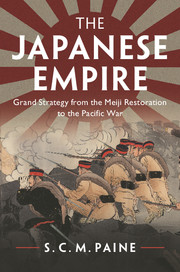Book contents
- Frontmatter
- Dedication
- Contents
- List of Maps
- Acknowledgments
- Maps
- 1 The Meiji Generation
- 2 The First Sino- Japanese War (1894– 1895)
- 3 The Russo- Japanese War (1904– 1905)
- 4 The Transition from a Maritime to a Continental Security Paradigm
- 5 The Second Sino- Japanese War (1931– 1941)
- 6 The General Asian War (1941– 1945)
- 7 Japan betwixt Maritime and Continental World Orders
- Select Bibliography
- Index
3 - The Russo- Japanese War (1904– 1905)
Published online by Cambridge University Press: 31 March 2017
- Frontmatter
- Dedication
- Contents
- List of Maps
- Acknowledgments
- Maps
- 1 The Meiji Generation
- 2 The First Sino- Japanese War (1894– 1895)
- 3 The Russo- Japanese War (1904– 1905)
- 4 The Transition from a Maritime to a Continental Security Paradigm
- 5 The Second Sino- Japanese War (1931– 1941)
- 6 The General Asian War (1941– 1945)
- 7 Japan betwixt Maritime and Continental World Orders
- Select Bibliography
- Index
Summary
It is certain that the situation in Asia will grow steadily worse in the future … and we must make preparations for another war within the next ten years.
General Yamagata Aritomo, April 1895, at the end of the First Sino-Japanese WarIn less than twenty years Japan has acquired the knowledge it has taken us centuries to learn.
George H. Rittner, Impressions of Japan, 1904, on the eve of the Russo-Japanese WarAt the end of the First Sino-Japanese War, General and soon-to-be Field Marshal Yamagata Aritomo, chief architect of the Japanese war plans, predicted another war over northeastern Asia within the decade. Although Yamagata could not have anticipated the precise circumstances of the Boxer Uprising in China, the Russo-Japanese War came right on schedule. The Boxers were the terrorists of their day. Their revulsion against Western culture and outrage at Western intrusions in their homeland coalesced into a movement to expel all Westerners from China and to kill the stragglers. As part of their rebellion, they tore up much of the Manchurian railway system laid at such great expense by Russia. To defend its investments, in 1900 Russia occupied all of Manchuria, the very area that Japan intended to become the core of its empire. Yamagata also could not have anticipated the Russian failure to honor its international commitments to withdraw these troops once order had been restored, but he clearly foresaw the general outlines of Russian and Japanese foreign policy that put them on a collision course. At issue: which empire would dominate Korea and Manchuria?
Yamagata also could not have anticipated that the young tsar, who assumed the throne upon the sudden death of his forty-nine-year-old father in 1894, would become captivated by the idea of empire in the Orient as the path to greatness or that a group of irresponsible noblemen with ambitious but unlikely plans to make money in the East would successfully brief the plan to the impressionable twenty-six-year-old Nicholas II. The irresponsible noblemen had a passion for redundant timber concessions along the Yalu river, in precisely the territory deemed vital by Japan's leaders for their country's national security. Russia, forested from East and West, had no need for more wood, let alone more wood in inaccessible locations.
- Type
- Chapter
- Information
- The Japanese EmpireGrand Strategy from the Meiji Restoration to the Pacific War, pp. 49 - 76Publisher: Cambridge University PressPrint publication year: 2017



